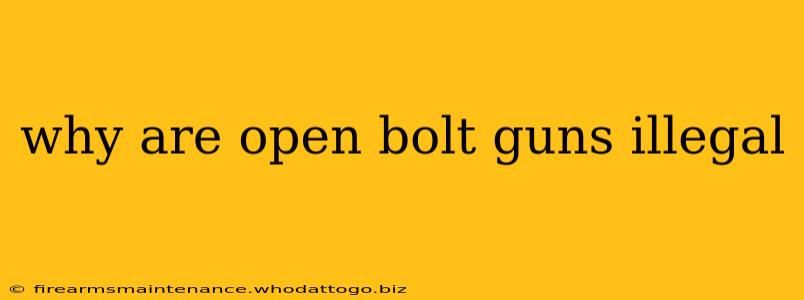Why Are Open Bolt Guns Illegal (or Often Restricted)?
The legality of open bolt firearms varies significantly depending on location, but the underlying reasons for their often-restricted status stem from safety concerns and historical context. Let's delve into the specifics.
What is an Open Bolt Gun?
First, it's crucial to define the term. An open bolt firearm is a fully automatic weapon where the bolt is not locked in place when the weapon is not firing. The bolt remains open until the trigger is pulled, at which point the bolt moves forward, chambers a round, and fires. This contrasts with a closed bolt firearm, where the bolt is locked closed until the trigger is pulled.
Key Concerns Leading to Restrictions:
Several factors contribute to the legal restrictions surrounding open bolt firearms:
-
Increased Risk of Accidental Discharge: The open bolt design inherently presents a higher risk of accidental discharge. With the bolt open, a simple bump or jarring movement could potentially cause a round to be chambered and fired. This is especially dangerous in uncontrolled environments.
-
Ease of Full-Auto Conversion: Historically, open bolt designs made it simpler and cheaper to convert semi-automatic weapons into fully automatic ones. This was a significant factor during times of stricter firearm regulations.
-
Use in Criminal Activity: Open bolt weapons, due to their fully automatic functionality, are more readily associated with criminal activity and mass shootings. This association has fueled tighter regulations globally.
-
Lack of Safety Mechanisms: Closed bolt designs often incorporate additional safety mechanisms, such as manual safeties, preventing accidental firing. Open bolt guns, by their design, may lack these safety features, exacerbating the risk of unintentional discharge.
Legal Status Variations:
It's critical to understand that there's no universal answer to the legality of open bolt firearms. Many countries and jurisdictions have specific laws that address these weapons individually, often prohibiting their ownership or manufacturing entirely, especially for civilians. However, some exceptions might exist for law enforcement or military purposes, where strict control and oversight are implemented.
Historical Context:
The historical context surrounding open bolt firearms and their connection to military weaponry has greatly influenced their legal treatment. Many of the earliest fully automatic weapons used open bolt designs, thus associating them with military-grade firepower. This association continues to play a role in legislative considerations.
Conclusion:
The restricted nature of open bolt guns arises primarily from safety concerns related to accidental discharge and the ease of conversion to full-auto. Their historical association with military weaponry and criminal activity further strengthens the arguments for tighter control and regulation. It's imperative to remember that the legal status of these firearms varies significantly depending on location, so always check local and national laws before handling or owning any firearm. This information is for educational purposes and should not be considered legal advice. Consult a legal professional for guidance on firearm ownership in your area.

